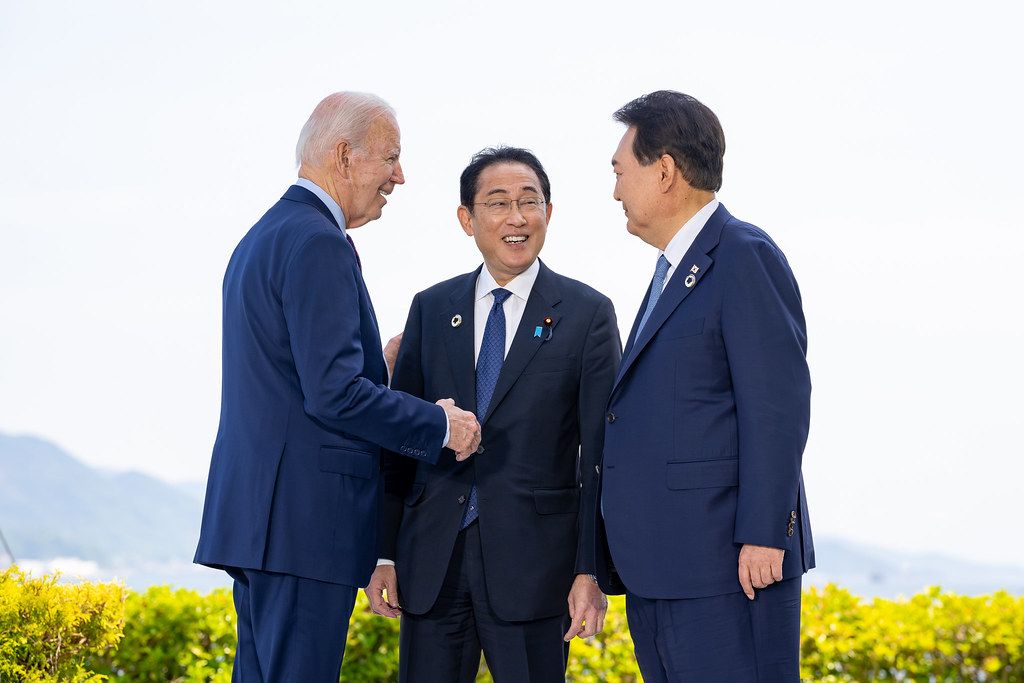Biden Hosts Japanese and South Korean Leaders at Camp David Summit Against Chinese Criticism

The Lede: President Joe Biden hosted the leaders of Japan and South Korea for a trilateral summit at Camp David where the countries solidified military cooperation amid rising tensions in the Indo-Pacific region and made plans to reconvene the gathering annually.
What We Know:
- On August 18, President Biden hosted South Korean President Yoon Suk Yeol and Japanese Prime Minister Fumio Kishida for his first foreign leader summit at Camp David.The leaders formalized a series of new commitments on diplomatic, economic, and military cooperation, which will include a multi-year plan for military exercises, deeper coordination on ballistic missile defense, and a new trilateral hotline for times of regional crisis.
- This was the first standalone trilateral summit between the three countries. Such meetings have typically taken place on the sidelines of other multilateral gatherings such as NATO and G-7 summits. The Camp David gathering last week was the first time since 2015 that the presidential retreat in Maryland has hosted a summit of foreign leaders. It is traditionally reserved for the most significant meetings.
- President Biden insisted the summit was not about China, but the three leaders released a joint statement condemning China's ‘dangerous and aggressive’ military actions in the South China Sea. China criticized the summit and North Korea conducted a missile test on the following Monday.
The Background: In 2017, the U.S. and South Korea began deploying the Terminal High Altitude Area Defense (THAAD) missile defense system. In retaliation, China began a series of unofficial economic sanctions on South Korea. Then President Moon Jae-in followed a policy of ‘Three Noes,’ by which his administration pledged not to deploy additional THAAD batteries, participate in a regional U.S.-led missile defense system, or join a trilateral alliance with the United States and Japan. South Korea has harbored a long-standing distrust of Japan stemming from the 35-year occupation of the Korean Peninsula, which involved forced labor and the supression of Korean culture. Recently, growing fears of China and North Korea’s assertiveness have been pushing Seoul and Tokyo closer in their relations. The leaders of the two countries have met frequently in the past months in bilateral efforts to warm relations. South Korea and Japan have ramped up their respective chips industries to adapt to the changing positioning of China and its role in global technological supply chains.
Likely Outcomes:
- Though not the focus of this summit, the development of semiconductors among the three countries will likely be a major technological effort that will induce increased cooperation as linkages to China are de-prioritized. This would be especially relevant to chips that are used in military equipment and in national security hardware.
- On Seoul’s part, the trilateral cooperation may face issues domestically as Yoon’s warming relations with Japan has been unpopular in South Korea. Also, Yoon’s predecessor made assurances to China that run against initiatives concluded in this summit.
- China will likely see this summit as a step closer to a NATO-like alliance in the Indo-Pacific, a troubling possibility given the unfolding of the Russia-Ukraine War. Beijing’s red-line in the matter will likely center around ballistic missile defense capabilities deployed in the region as they may threaten China’s strategic ability to launch strikes. The Chinese military will probably keep a watchful eye on increasing coordination on that front as the outcomes of this summit appear to throw South Korea’s previous administration’s assurances out the window.
- The U.S. may be thinking ahead to potential cooperation to the further flung AUKUS alliance with the U.K. and Australia and with Southeast Asian countries as the Indo-Pacific competition ramps up. These would be highly provocative developments for China that would come dangerously close to a NATO-like alliance.
Quotables:
“Our countries are stronger and the world will be safer as we stand together. And I know this is a belief we all three share. …I look forward to working with both of you as we begin this new era of cooperation and renew our resolve to serve as a force of good across the Indo-Pacific and, quite frankly, around the world as well.” – Joe Biden, president of the United States
"I would just underscore that at this summit today, this partnership is not against anyone. It is for something. It is for a vision of the Indo-Pacific that is free, open, secure, and prosperous." – Jake Sullivan, White House national security adviser
“I wish to take this moment to raise the security … coordination between Japan, ROK, and the U.S. to new heights while strengthening the coordination between the Japan-U.S. and the U.S.-ROK alliances as we deepen our cooperation in the response to North Korea.” – Kishida Fumio, prime minister of Japan
“The stronger coordination between Korea, the U.S., and Japan requires more robust institutional foundations. Moreover, challenges that threaten regional security must be addressed by us building a stronger commitment to working together.” – Yoon Suk Yeol, president of South Korea
“No country should seek its own security at the expense of other countries’ security interests and regional peace and stability. The international community has its fair judgment on who is stoking conflicts and exacerbating tensions… Attempts to cobble together various exclusionary groupings and bring bloc confrontation and military blocs into the Asia-Pacific are not going to get support and will only be met with vigilance and opposition from regional countries.” – Wang Wen, spokesperson for the Chinese foreign ministry
Good Reads:
A Defense Agreement Likely to Deepen Chinese Rancor (NYT)
The Japan-South Korea-US Summit Is Bad News for China (The Diplomat)
Experts react: The US-Japan-South Korea summit was ‘historic.’ But what did it accomplish? (Atlantic Council)
